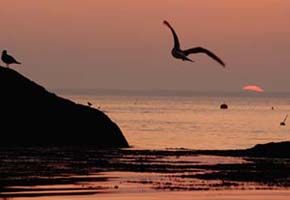 |
 |
| current issue |  | past issues |  | send a letter/news |  | address update |  | advertise |  | about us |  | alumni home |
Campus Currents
|
Testing the Water
A one-week course for would-be marine biologists By Beth Potier |
Easy to print version |

|
It's late August, and, in addition to the usual incoming freshman ponderings—Did I choose the right major? Will I like my roommate?—Lauren Schnittger '13 and Jesica Waller '13 have another burning question.
Does gastropod morphology differ when it's exposed to wave action?
Happily, the two UNH freshmen are well positioned to learn the answer: They're at the Shoals Marine Lab on Appledore Island, two of the 12 students enrolled in Zoology 410, or Marine Immersion. Since 2007, the week-long, two-credit course taught by Jessica Bolker has introduced incoming freshman students to UNH, college academics and each other, with a little conchology thrown in for good measure. "It's not just 'welcome to college'—it's 'welcome to your discipline,'" says Bolker, an associate professor of biological sciences.
Indeed, Schnittger, Waller and their classmates are beginning their marine biology careers within hours of stepping off the R.V. Kingsbury from Portsmouth, N.H., wading into intertidal zones on sheltered and exposed sides of Appledore to collect snails and other organisms. The following night, with the help of Bolker, co-instructor Jason Goldstein, a doctoral student, and teaching assistant Francoise Morison '09, the students pore over scientific journals and consult a variety of resources to help identify their haul. Along the way, they dive into academic life and forge strong bonds with 11 future classmates as well as a handful of professors.
"I feel like I'm learning more in this one week than I did in high school," says Katie Kozacka '13.

|
Bolker, associate director of the Shoals Marine Lab, created Marine Immersion to provide a taste for the field work that wouldbe marine biologists normally encounter only after two years of classroom-based core courses. It's a sneaky bit of academic marketing: "This frontloads the fun stuff," says Bolker.
Fun, yes, but not easy, with a syllabus packed with labs, readings and papers. Visiting faculty fill the evenings with lectures on weighty topics like "Vertebrate adaptations for the marine environment." A field trip on a commercial fishing boat provides the students' only off-island experience, and even dinner conversations turn to biology, as one night several students debate the merits of computers versus hand calculations for measuring samples in the field. "They earn their two credits in a week," says Bolker. "College is pretty intense, and this is supposed to be intense."
Emily Wright '13, untangling seaweed in a tank in the Palmer- Kinne laboratory building after writing a paper the night before, concurs. "I think it's really preparing us for what we're going to face," she says.
And while plotting air bubbles on seaweed or dissecting a pregnant spiny dogfish can certainly boost the students' marine biology knowledge, Marine Immersion aims to cultivate habits of mind that will serve the students throughout their academic careers. "There are things that look to the students like academic assignments about marine biology, but are really about how to read a science paper or managing time," Bolker says. "One of the goals is to help students build an academic identity. For many people, that's one of the most profound things that happens in college."
Find more information on the Marine Program
blog comments powered by Disqus
